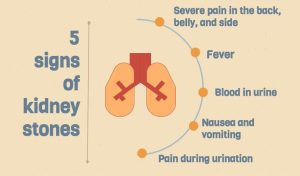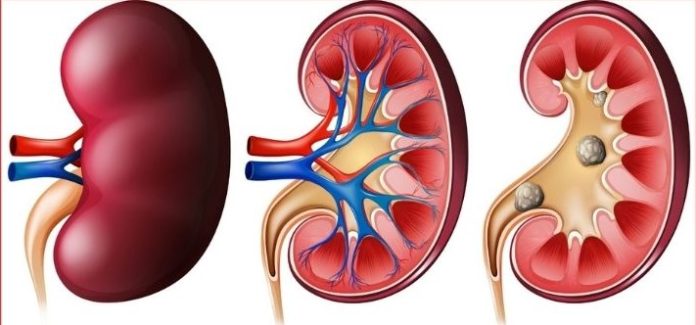Urinary or, more commonly, kidney stones have been said to lead to loss of kidney function.
When an individual loses the functions of any or both kidneys, it is an emergency situation that needs urgent attention. Otherwise, the patient can lose his life.
According to experts, eating unhealthy diets, lack of proper sleep routine, and leading a sedentary lifestyle can result in preventable diseases such as kidney stones.
What are urinary stones?
Doctors say that kidney stones are formed when urine contains too many minerals from the body. The stones are made primarily from calcium or uric acid and vary in size. They may also travel to other areas of the urinary tract if not diagnosed and treated timely.
How do you get kidney stones?

Not drinking enough water, leading to dehydration, as well as obesity are two of the most common causes of kidney stones, according to experts.
“When you don’t drink enough water, your urine becomes more concentrated, and the amount of certain minerals in your urine rises, causing kidney stones to develop,” says a urologist.
However, in some cases, kidney stones can also be attributed to multiple factors such as the following:
Low urine volume: If you reside in a hotter region and your urine is low and concentrated, your salts aren’t dissolved properly due to less fluid.
Diet: Sodium, animal protein, and high-oxalate food such as spinach, rhubarb, and grits increase your chances of getting a kidney stone, nutritionists warn.
Family History: A family history of stones increases your likelihood of getting a kidney stone.
Medication: Medication such as antibiotics, diuretics, vitamin C, and calcium supplements increase the risk of getting a kidney stone and need to be monitored.
Medical condition: Those living with type-2 diabetes, hyperparathyroidism, renal tubular acidosis,and other genetic diseases increase people’s chances of forming a kidney stone.
Experts warn that kidney stones can be extremely painful and inconvenient. They say that the larger stones usually block the ureter, causing discomfort in the lower back, on the sides or in the groin area.
Symptoms of kidney stones
In many cases, kidney stones are asymptomatic, and patients become aware of the condition when they begin to pass blood in urine. In order to attend quickly to the possibilities of kidney stone, note the following signs and symptoms:
- Severe pain in the back, belly, and side
- Difficulty or pain during urination
- Fever
- Blood in urine
- Nausea and vomiting
Preventing kidney stones
Some of the common preventive measures as suggested by urologists include:
- Staying hydrated and drinking enough fluids
- Consuming less salt in your diet.
- Reducing meat consumption
- Monitoring medications and consulting the doctor for risk factors
Bottom line
Stones in the kidneys can be avoided by taking appropriate preventive measures. If you are susceptible to kidney stones, you must remain hydrated to prevent the minerals in your urine from crystallizing into stones.
Don’t delay to see the doctor once you notice signs and symptoms of kidney stones.


